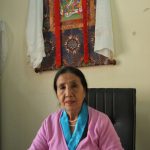
Dolma Yangchen is an inspiration to Tibetan women everywhere. A campaigner and an activist, she has proved herself fearless in a man’s world, undaunted by bureaucracy and irrepressible in the face of reluctance. She is proud to have served her fellow Tibetans for 35 years.
What has driven her to step aside from a successful career and financial reward to put the needs of her community before her own personal ambitions and comforts?
While at university in Bangalore she found herself liaising between Tibetan students and the university authorities and this led to her volunteering with MYRADA’s Tibetan Rehabilitation Programme as the liaison person for her settlement. MYRADA is an Indian non-government organisation (NGO) whose founder was a retired Indian Army officer – a great friend to the Tibetan people – and which works to improve living conditions in rural, drought-prone areas of southern India.
She loved working at MYRADA and the people there became a lifelong influence. She accepted a job offer when it came, and stayed on despite the opportunity of a lucrative banking job.
Dolma Yangchen recalls liaising with government officials at the start of her career. It was great experience, she says, and they were very willing to help Tibetans. “It was very much a man’s world. I was very young and was sort of pulled into it, I wasn’t looking for it; it just happened”, she says.
She established self-help groups in remote villages, developing the idea of women working together to achieve more. Small-scale but wildly successful, she later adapted this approach to work with Tibetan women. “Working alone, you only have one brain” says Dolma Yangchen, “In a group one can be more forceful and build confidence”. This work changed lives; elderly visitors still call by to reminisce on the old days and show their appreciation for her efforts.
In 1983 she married and went into business with her husband in Bangalore. She left MYRADA in 1986 to work with him full time, always keeping her links with the settlement and her community.
Then in 1995 came the offer of a job as Project Officer at Lugsung Samdupling Tibetan settlement. Dolma Yangchen knew the chief there and was inspired by his work. This was another big decision for her, again with financial implications. Her husband, as ever, encouraged her to take the job.
She was at Lugsung for 14 years, working with the settlement farmers. They grew maize – one crop each year on their tiny holdings, and in this drought-prone region, if the maize failed there was real poverty. They spent winters trading clothes to supplement their income.
She concentrated on irrigation so farms could diversify. Back then people were still hoping to return to Tibet and were reluctant to invest too much in their livelihoods in Bylaguppe. “I remember my mother saying that planting a coconut tree was pointless, they would be gone before it bore fruit”, she recalls.
So, knowing the soil was very fertile, the settlement officers set up a pilot irrigation system. It was a big project entailing a lot of hard work and red tape but it was a huge success and the land produced bananas, fruit, vegetables, chillis, ginger – crops that people had only dreamed of. They went on to irrigate 75 acres in three years and then moved on to install the first ever solar-powered irrigation project in a Tibetan settlement. The project was run by the Settlement Office with funding from Norwegian Church Aid who work worldwide to eradicate poverty and injustice. Every expectation was exceeded. She was invited to Norway on a speaking tour to raise awareness about the project and secure further funding. “I always took five minutes of every talk to tell people about Tibet and what is happening there” she says, and so Dolma Yangchen the campaigner was born!
Back at home, she was invited to join the Tibetan Women’s Association, and later became a group leader for her local community. Here, she found a new mindset, “At least as many men as women came to the TWA meetings”, she says, “The women felt unable to leave their homes and farms”. She remembers that even if the women came themselves, “they would mostly drift off when it was time to milk the cows”. She also realised that the prevailing mindset was that men would be better at the meetings and campaigning.
Reflecting on this she feels there was—maybe still is—little confidence among women about their ability to contribute. “But you don’t need to be educated”, she insists, “What matters is that your heart is in it”.
Progress was slow. She says that while there are now educated women, they are reluctant to take jobs where they can make decisions and influence events because of home and family commitments. And there are still negative perceptions of successful women. “This represents a big loss to the community”, she says.
She was elected President of her Regional TWA Chapter, serving two three-year terms, and later a three year term as Central Executive member in Bylaguppe, working at this alongside her job at Lugsung Settlement, as well as a very personal project which she did for six years with her husband – informal evening classes for local children. She understands life in the settlements, “People had to give priority to the daily needs of home and fields over education”, she says, “They needed the children to work with them on the land”.
In Bylaguppe, she set about renovating and expanding the Regional TWA office and tailoring centre, and soon they opened a shop selling their tailoring, plus handicrafts from other TWA centres.
Despite being retired, Dolma Yangchen keeps on campaigning even in the face of government red tape and negative attitudes. When she was elected President of TWA she knew not even three years up north in “cold McLeod Ganj” could deter her! Her husband is, as always, totally supportive, staying down south to take care of their business and home.
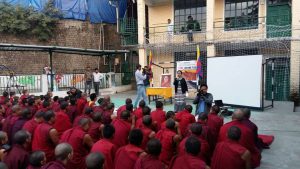
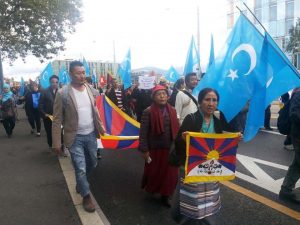
Of the Tibetan situation, she feels the hope of returning to Tibet is still there. “But it’s up to the younger generation now”, she says, “They go abroad, but this does not mean a loss of hope. They raise awareness in the different countries where they settle, and as the Tibetan communities overseas grow they are able to make new initiatives and to campaign for Tibet around the world, creating awareness among the general population as well as governments”.
She speculates that maybe China will collapse. “Their own people want democracy”, she says, “Like everybody, they want peace and freedom. Many Chinese people are living and working across the world and experiencing democracy. If we are patient, sooner or later, the people of China will prevail in their own country.”
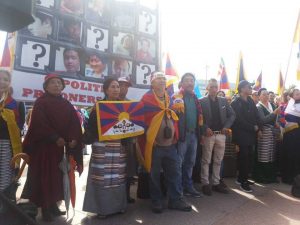
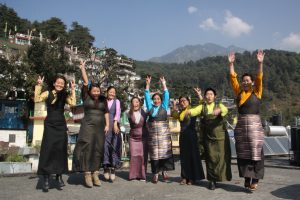
All photos: TWA




 Print
Print Email
Email













